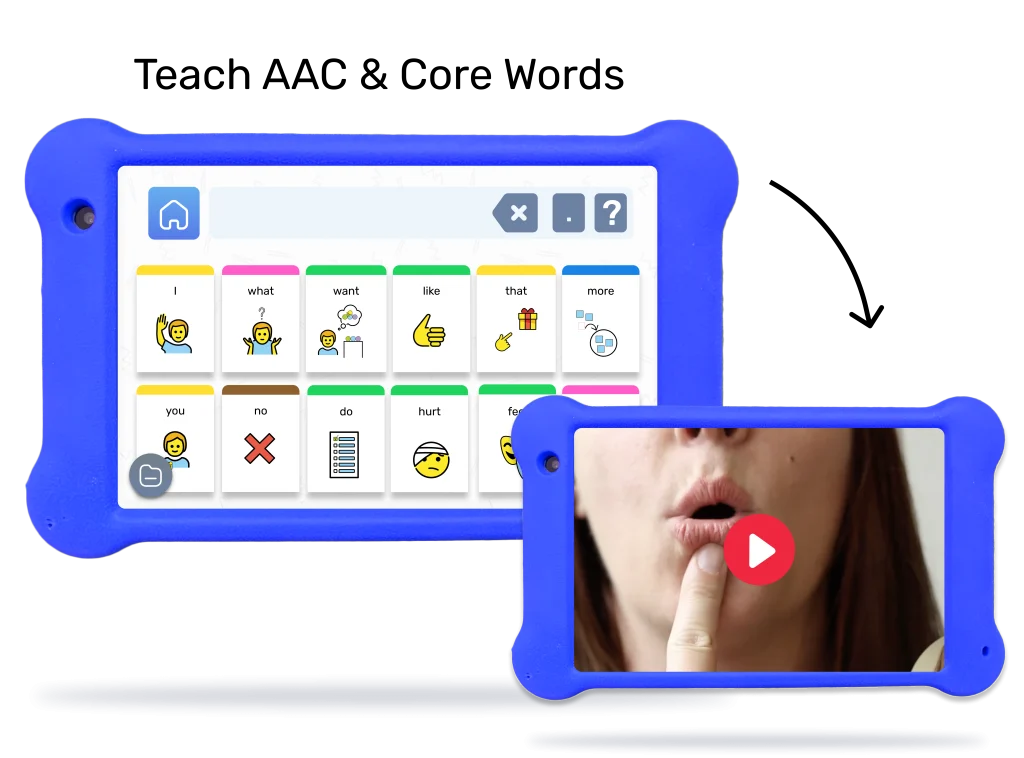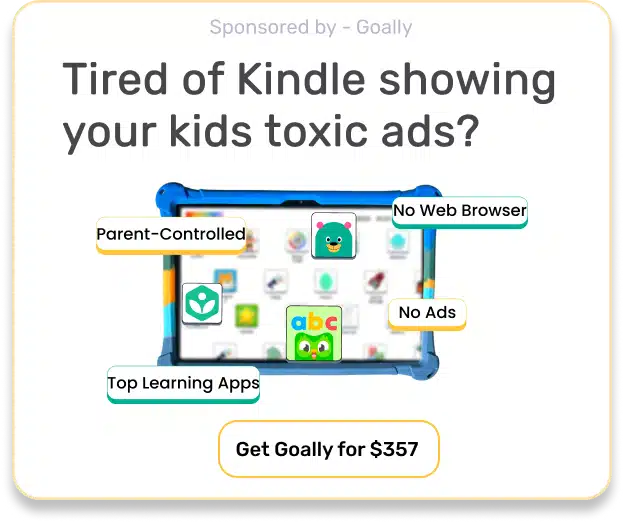Are you tired of hearing about the evils of screen time? As caregivers and parents of neurodivergent kids, we’re constantly bombarded with warnings about the perils of too much screen time. But hold on a minute! What if we told you that healthy screen time can actually be beneficial for your child’s development? That’s right – it’s time to flip the script and explore five reasons why screen time is good, especially for kids with thinking and learning differences. This listicle will challenge conventional wisdom and provide valuable insights into how technology can empower our children to thrive. Let’s dive in!
Table of Contents
1. Enhancing Communication Skills
Healthy screen time can help improve communication skills in neurodivergent kids. There are many apps and games made just for them! These tools make it fun to practice social interactions, learn new words, and build confidence.
- Goally’s learning tablet has special content: Goally’s learning tablet offers tailored content designed specifically for children with diverse needs. It provides an engaging platform where they can practice their language skills through interactive activities that cater to their individual strengths.
- Interactive games teach problem-solving: Games that encourage teamwork or require players to solve problems together are excellent ways for neurodivergent children to develop their communication abilities further. These games often involve collaboration between players or require them to communicate effectively in order to succeed.
- Visual cues on screens help understand non-verbal communication: For many neurodivergent kids, understanding non-verbal cues such as facial expressions or body language can be challenging. Screen-based activities that incorporate visual cues provide opportunities for these children to recognize emotions more easily while practicing essential social skills.
2. Boosting Cognitive Development
For many reasons screen time is good when it helps cognitive development. Digital tools offer exciting environments that challenge children’s minds, improving memory, attention span, and critical thinking abilities.
- Educational apps fit different learning styles (visual, auditory, or kinesthetic): There is a wide range of educational apps available that cater to various learning styles. Whether your child is a visual, auditory, or kinesthetic learner, there’s an app out there that can help them grasp new concepts more effectively.
- Puzzles promote logical reasoning: Engaging in puzzles and strategy games can be an excellent way for neurodivergent children to enhance their cognitive skills. These activities require them to think critically and apply logic in order to solve problems or complete tasks.
- Online resources give access to lots of information: The internet offers a wealth of information at our fingertips. For curious minds, this means endless opportunities for learning about different subjects and expanding their knowledge base.

Read more: Why Do Kids Act Out?
3. Encouraging Creativity
The digital world lets kids be creative! From drawing programs to music composition apps – healthy screen time allows neurodivergent children the chance to explore their artistic talents while developing essential motor skills.
- Fine motor skills & spatial awareness through drawing apps: Drawing applications offer numerous benefits for neurodivergent kids. They not only encourage creativity but also help develop fine motor skills as they practice using touchscreens or styluses with precision. Additionally, these applications improve spatial awareness by requiring children to consider the size and placement of objects within their drawings.
- Auditory processing & rhythm recognition with music apps: Music composition apps provide an engaging platform for children who have difficulty processing sounds or recognizing rhythms in traditional settings. By experimenting with different instruments and composing melodies on screen-based platforms, they can strengthen their auditory processing abilities while enjoying the creative process.
- Language development & imagination through storytelling tools: Digital storytelling tools allow neurodivergent kids to express themselves creatively, enhancing language development simultaneously. These platforms often include features such as text-to-speech capabilities or interactive story prompts that support literacy growth and spark imaginative thinking.

| App Type | Skill Developed |
|---|---|
| Drawing | Fine motor skills & spatial awareness |
| Music | Auditory processing & rhythm recognition |
| Storytelling | Language development & imagination |
4. Building Independence
For many parents of neurodivergent kids, fostering independence is a top priority. Technology can help by offering tools that teach life skills such as time management or self-care routines.
- Visual schedules: Using visual schedules on tablets can be an effective way to help children with thinking and learning differences establish daily routines. These digital aids provide clear, easy-to-understand visuals that outline the tasks and activities for each day. These tools make it simpler for kids to follow along and develop their sense of independence.
Build Custom Printable Visual Schedules
Is your child having trouble managing their routines? Here’s a free visual schedule builder. Goally’s custom tool allows you to create printable personalized schedules that motivate your child to focus on their tasks. Perfect for morning, homework, and bedtime routines, this free visual schedule builder is easy to use and will help your child reach their full potential.
Click below to make your CUSTOM printable visual schedule! 👇
- Reminder apps track tasks and appointments: Reminder apps are invaluable tools for teaching time management skills to neurodivergent children. They allow them to set reminders for upcoming events or tasks they need to complete. This helps kids stay organized and accountable.
- Assistive technology: Various assistive technologies are available that support reading comprehension or note-taking for children who struggle in these areas. From text-to-speech applications to digital highlighters, these tools empower neurodivergent kids by providing the necessary support they need in order to succeed academically.

Read more: What Activities Make ADHD Worse?
5. Promoting Emotional Well-being
Last but not least, technology can play a crucial role in promoting emotional well-being. Apps designed to help children identify and manage their emotions can be invaluable for kids with thinking and learning differences.
- Mindfulness apps: Mindfulness applications offer guided meditation sessions or breathing exercises. These exercises are aimed at reducing stress levels while promoting relaxation among users. This includes neurodivergent children who may have difficulty managing their emotions effectively without assistance.
- Emotion recognition games: Games designed specifically around emotion recognition provide opportunities for kids with thinking and learning differences to practice identifying various emotions through facial expressions or body language. These games not only help improve social skills but also contribute to their overall emotional well-being.
- Digital journals: Digital journaling platforms offer a secure, private space for neurodivergent children to express their thoughts and feelings without fear of judgment or ridicule. This practice can be therapeutic and beneficial in promoting emotional well-being.

Goally | Teach Kids AAC & Core Words
Is your child facing challenges in expressing themselves or communicating effectively? Goally’s language apps support their journey in building essential communication skills! All of these apps are included our skill-building tablet made for kids.

The Word Lab and AAC Talker apps provide a simple, engaging platform for your child to learn core words and become a functional communicator right from the start. Customize the experience with a voice that suits them, and watch as their confidence grows in expressing their thoughts and needs!
But we don’t stop there. Our Balloon App helps build the skills needed to use AAC by engaging your child with fun, interactive “pop the balloons” exercises. It’s a game-changer for kids who need that extra boost in communication.
In today’s world, technology is everywhere. It’s important to see the reasons why screen time is good. From better communication skills and cognitive development to more creativity, independence, and emotional well-being – the digital realm offers valuable opportunities for growth and learning. As caregivers and parents, let’s embrace these advantages while keeping balance in our children’s lives. After all, when used wisely, screen time can be an empowering tool that helps our kids reach their full potential!
This post was originally published on 04/17/2023. It was updated on 11/22/2023.

Goally
We help parents teach their kids life skills, like doing bedtime and morning independently. Backed by science, we incorporate evidence-based practices and expert-informed designs in all of our apps and content.







